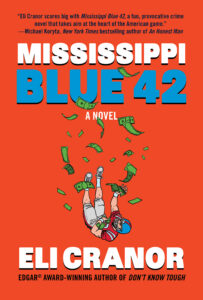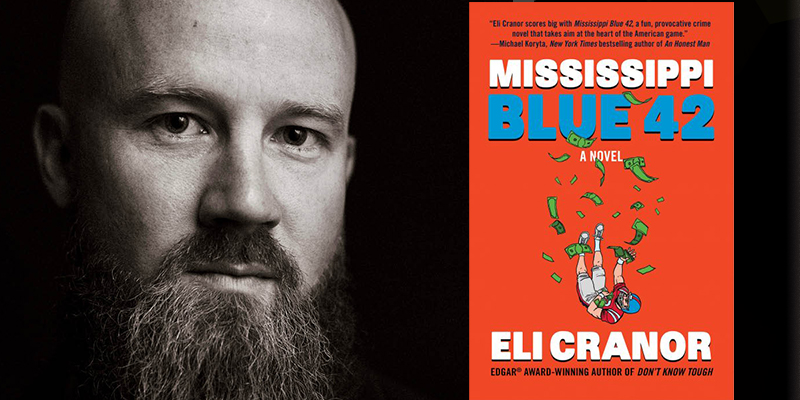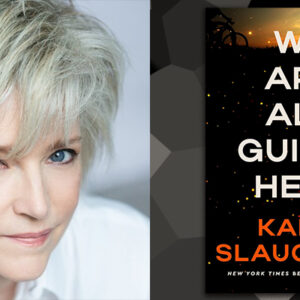Along with loads of awards, Eli Cranor’s first three novels—Don’t Know Tough, Ozark Dogs and Broiler—collected rave reviews that hailed the Arkansas writer as an exciting new voice in Southern noir. His latest is a rollicking demonstration of range and wit that confirms his status as one of the country’s must-read novelists, genre be damned.
Mississippi Blue 42—the title nods to quarterback-speak and the state where the action unfolds—focuses on an investigation into a fictional college football program that has “gotten too good too fast.” The University of Central Mississippi Chiefs won the national championship in 2012, and as they go for two in a row, a cascade of scandals—think: duffel bags full of cash—threatens to turn it all to rubble. Cranor’s vivid cast, which includes a performatively devout head coach, a profoundly corrupt lawmaker and a smart Black QB who won’t cooperate with the program’s vicious powerbrokers, is headed by Rae Johnson, a young FBI agent and the daughter of a successful coach.
The action takes place at a hinge moment, just before college football and other nominally amateur sports were forced to acknowledge that the players who sacrifice their time and jeopardize their bodies deserve a bit of the billions of dollars generated by their labor. Speaking from his home, Cranor talked about the relationship between character development and humor, college football’s “original sin” and writing another novel featuring Rae Johnson.
Tell me about the idea for this book, which you started writing about a decade ago, around the time you were setting some school records as a college quarterback in Arkansas.
When I talk about Mississippi Blue 42 I always say that it’s kind of an alternate history. You take a fictional federal investigation and show people how we got to where we are in college football. And in a bigger sense, America. There was a moment we had, about 10 years ago, when the mythology of America and of college sports—the veil was lifted. I tried to dramatize that moment, and to use football as a metaphor for our country. It took a long time for me to get there.
It finally locked into place about the time of that FBI probe into college basketball. (The case, focused on illegal payments to players, resulted in several convictions, but subsequent reporting has raised questions about the legitimacy of the investigation). The only people who got any sort of repercussions were assistant coaches, who were mostly Black dudes, and players. The players who were implicated in this thing lost their whole season. So I started thinking, what if that FBI case was happening in college football?
“[T]hese ideas of capitalism, competition in college football—they parallel so well with America.”Why is college football fertile ground for the sort of stories you want to tell?
You can think about college football in terms of the Original Sin. It was broken from the moment that you took an amateur sport and began to capitalize off of it. And not just capitalize—I’m talking billions of dollars. When you trace all that back to the early years of college football, some coaches were just professors who coached on the side. Then they started to pay those guys, and they didn’t have to teach anymore.
That’s why these ideas of capitalism, competition in college football—they parallel so well with America. These entire infrastructures and social hierarchies were built around secretly paying these kids. That’s truly American too, man.
There’s a conversation in the book where someone brings up the idea of fairness in college football. To which the other person says—and I’m paraphrasing here—Fairness? This is college football! It says a lot about the characters and the book’s themes. How do you find a character’s voice? I know that sometimes you read your stuff out loud to family members.
My first three novels are really dark. I’m really interested in how this book will be received, because it’s not a complete lane shift for me, but it’s close. It’s a whole new thing that I’m doing here. If you trace my influences back, I was reading a lot of Southern lit—Faulkner, Flannery O’Connor, Larry Brown, Harry Crews. And then Jesmyn Ward, whose books came out later. If you look at my first three books, that’s what I was emulating.
From there, I got into Elmore Leonard, just absolutely through and through. On a line level—and it’s like comparing yourself to Michael Jordan—that’s how I wanted it to be: spare and deadpan. And then in terms of the big picture of it all, it was Carl Hiaasen. I think humor all comes back to character. A guy like Eddie Pride Junior, a character in my book who owns a beach chair business and is a die hard college football fan. He’s paying his own money to these 18, 19-year old boys. As a writer, you’ve just got to know that guy to understand what he’ll do and how far he’ll go.
Eddie, at one point, is trying to keep a low profile—while wearing an Ohio State mascot costume, which has a buckeye nut for a head. He’s worried but then thinks: “this was college football; people wore weird shit all the time.” It’s hilarious. Anyone who’s watched 10 seconds of a college game will get it.
I’m so glad that you thought it was funny, because that’s a new world for me. That’s a new stretch. And it feels really like a fun place to be in. In these times, I’m excited about writing more books like this.
I like how Rae masters the intricacies of football in part to stay close to her father, a successful coach. College football is violent and a lot of it is pretty sordid. But is it also a sort of social glue that bonds families and communities?
Absolutely. Arkansas doesn’t have a professional sports team. Mississippi doesn’t have a professional sports team. So the college teams, they’re everything. I do this call-in for Arkansas sports radio every week, where I recommend books. During the football season, you can literally judge the emotional ups and downs based on how the game went Saturday. Any diehard fandom is like that, but what makes this different is that these are 18- to 23-year old college students.
This is a series opener, which means we’ll see more of Rae. What can you share about what’s next for her?
I am a few days away from submitting the second book in this series to my editor. The soil is so rich when it comes to football. There are so many different angles, so many corners that are ripe for corruption. The title is Florida Green 17, and it’s set in a fictional university—Palm Beach University. It’s a 10-year jump, from then (2013 in Mississippi Blue 42) to now (the 2020s). The world is completely different. And that’s what the second book is about: what is it like living in a world where everything has changed, where there are no rules—whether we’re talking about football or we’re talking about the country—and the veil has been lifted?
***


















